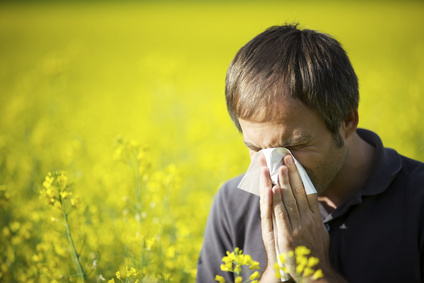
Herbal Medicine Can Often Help
Allergies, intolerances or hypersensitivities are big news lately. It is reported that never before have so many people been sensitive to environmental and food allergens. If you, or someone you know, suffers from hayfever, rhinitis (hayfever-like symptoms all year round), persistent cough, itchy throat, skin problems (including persistent nappy rash), digestive or appetite disturbances, asthma, itchy eyes, thrush or recurrent infections you may have become ‘hypersensitive’.
The advice from many health professionals is to completely avoid the allergenic substance. In some cases, such as severe peanut allergy involving anaphylactic shock, this may be the only way. But, is there an alternative? As a Medical Herbalist and Allergy Therapist, I prefer to take a two-pronged approach to allergies. Allergy testing, which I carry out using some simple and painless equipment which gives immediate results, can be a helpful way of identifying the substances to which a person has developed intolerance.
But what of the sensitivity within the person as a whole – why has this allergy manifested, and why now? There may be a number of factors contributing to the hypersensitivity. Firstly a person`s constitution, which can often have a hereditary aspect to it: people from families with a tendency to asthma, bronchitis, hayfever and eczema often have a higher than usual incidence of allergies. People can be devastated to find that they are allergic to a much loved family pet, or to invisible environmental moulds in their beautiful home. Avoidance in these cases may be a difficult option.
An alternative solution to avoidance is to take an in-depth look at the patient and establish what changes can be made to decrease their hypersensitivity. The body has the capacity to tolerate a certain amount of substances to which it is sensitive, but then it may reach a point where the load becomes too great and the symptoms appear: this is simply the body`s way of bringing something to our notice that needs attention! You will often hear people say that they `used to have` hayfever or a food intolerance, but now they no longer do: if you think about it, this means that their own bodily functions have improved, because the substances they used to have reactions to have not changed! A well-functioning digestive and immune system will effectively clear these substances from the body without causing any uncomfortable symptoms. A qualified Medical Herbalist may prescribe medicines depending on a personal assessment of the individual, to address hypersensitivity by improving those functions in the body which are involved in allergies and intolerances. Examples of commonly used herbs include Urtica dioica (stinging nettle), Chamomilla recutita (german chamomile), Sambucus nigra flos (elderflowers), Taraxacum officinalis radix (dandelion root) and Stellaria media (chickweed).
Any number of factors affecting the functioning of the body may impact on the body’s ability to cope with allergens rendering it hypersensitive. Examples may include a recent change in diet or lifestyle, a sudden or sustained stress, a change in the demands on the body such as puberty, childbirth or menopause: all these and more put extra demands on the body. This may help explain why allergies seemingly ‘appear from nowhere’. For further details please contact me.
Lynda Jones BSc (Hons) Medical Herbalist
Hi! My 4 year old has lots of food allergies, environmental allergies and asthma. Gets recurrent infections and i am struggling with him now. Can herbal medicine help him? I am so desperate as it’s affecting his school and everyone.
Hi Vipra, can you please email me on jones.lynda@yahoo.co.uk where I can answer this properly :). Thank you x